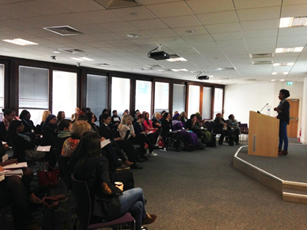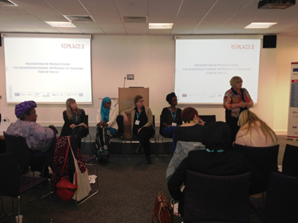
|
|
30th of May 2014 Linking politics and community engagement Ifrah Ahmed, a young Somalian woman who suffered FGM, talked to the conference about the importance of community engagement. She talked about her experience since arriving in Ireland in 2006 as an asylum seeker. After recognising herself as a victim of FGM, she started an anti-FGM campaign based on two main successful activities. The first one was a lobbying campaign to the Irish government, developed both by herself and the youth club she set up: United Youth of Ireland. After meeting the current President of Ireland, Michael D. Higgins, during his electoral campaign, the FGM bill was finally passed in 2012, prohibiting both FGM in Ireland and the removal of children from Ireland with the purpose of having FGM done abroad. The second action was working with the community, through the organisation of several workshops where Ifrah worked as a trainer. These workshops targeted both women, supporting them in choosing not to subject their daughters to FGM, and to the police, particularly the child protection unit teaching them how to support FGM- affected families. Supporting FGM survivors The presentation by Leyla Hussein, an anti-FGM activist, was focused on how to help a woman that has suffered FGM. She spoke about her partnership with the Maya Centre, a centre for women that offers them emotional and psychological support, through therapy groups with qualified counsellors. As Layla stated, common effects on these women are post- traumatic stress, which includes flashbacks of their experiences, sexual dysfunction and depression. They usually also experience fear of sex, and some kind of suspicion of mother - daughter relationship. She also said that one of the risks of FGM is that it can be the beginning of further violence. Leyla stressed the importance of working with the media, which can raise awareness about this issue. As an example, she talked about her experience making the documentary "The Cruel Cut", which shows women that have suffered FGM as survivors, instead of the usual victim approach. Finally, she stated that, as FGM has no way back, prevention must be the key to fight against it, and community engagement is essential to this purpose. Consequences of FGMUndoing FGM Elise Johansen, representative of the Norwegian Centre for Violence and Traumatic Stress Studies (NKVTS), presented a study about girls and women with type III FGM seeking surgical procedures to undo their infibulations. The study looked at the factors that influence these requests, exploring to what extent it is a generation revolt, aiming to improve health, an individual reclaim of body or an expression of a broader socio-cultural change of abandoning FGM. As a matter of conclusion, Elise acknowledged health care as a key instrument for supporting and improving the lives of women who have suffered FGM, as well as a way of preventing FGM in the future. Economic consequences Hilary Burrage explored the issue of the economic impact of performing and/or stopping FGM in places where it is practiced. Through her research, Hilary has identified many situations in which money is involved in the practice of FGM. Apart from the payments that "cutters" normally receive, the whole family economy is often involved (i.e. an entire year's harvest may be invested in this practice and the ceremonies attached to it), while diasporas might send money that contribute to the payment of it. On the other hand, programmes at national and international level which would not exist if FGM stops, as well as health costs related to girls' and women's recovery from the practice which would be spent to address other issues. The politicians' perspective Norman Baker MP, Minister of State for Crime Prevention and Lynne Featherstone MP, Minister in the Department for International Development, provided video addresses to explain their perspectives on FGM prosecution and prevention, through a variety of programmes. Normal Baker is in charge of government policy on the matter and he is encouraging prosecution as a way of stopping FGM in the UK. In addition, support for FGM prevention will be given by a £35million UK Government programme which is expected to reduce FGM by 30% in at least 10 priority countries in the next 5 years, as was presented by Lynne Featherstone. |
|
|
|
About 50 international delegates attended the REPLACE 2 conference "Prevention or Prosecution? The Behaviour Change Approach to Tackling FGM in the EU" that took place on 11th April 2014 at Coventry University's London Campus (UK). It addressed the cultural, legal and social dynamics associated with the practice of FGM and the need for prevention and/or prosecution strategies according to the many different professionals and activists involved in the issue. Among the keynote speakers there were representatives from politics, including the Minister of State for Crime Prevention, Norman Baker; academia, such as professor Dr. Els Leye, from the International Centre for Reproductive Health at Ghent University; and activists like Ifrah Ahmed and Leyla Hussein. The conference included parallel workshops on community interventions and the consequences of FGM, other sessions showing prosecution and prevention strategies as well as poster presentations about FGM in different European countries, led by academics, practitioners, consultants and health staff. If you want to read more about the sessions and download materials please visit our website: www.replacefgm2.eu/conference/default.aspx  Leyla Hussein in the REPLACE 2 Conference in London.
|
|
|
|
|
|
Prevention or prosecution? |
|
||||||
|
|
Elinor Clarke, from Coventry University, talked about the existence of three flaws regarding FGM prosecution. On the first one, there is plenty of condemnation of FGM. On the second one, there is difficulty regarding identification, recording and service provision. On the last one, there are communities that perpetuate FGM, believing it is acceptable. Securing prosecution and conviction is unlikely without taking into consideration education, services around psychological health and well-being, and support for FGM- affected women and girls. Changing behaviour to prevent FGM Linda Ederberg presented the CHANGE project, conducted by Terre des Femmes in Germany, which implements the behaviour change approach developed under the previous REPLACE project. During the first year of this project, 50 CHANGE agents from different African communities have received intensive training on FGM. The change agents will be addressing hard-to-reach groups within their community and advocate for a change in attitudes and behaviour towards the abandonment of FGM. Conclusions Many different perspectives during the REPLACE 2 Conference, highlighted the fact that EU countries must develop or fully implement strategies to address the practice of FGM, both for women who have suffered it and for girls and women at risk. REPLACE 2 is focused on prevention and aims to implement a behaviour change approach at the community level.  Alison Hunphreys, Ifrah Ahmed, Els Leye, Leyla Hussein and Professor Hazel Barrett during the Q&A final session. Spread the word! REPLACE 2 has reached more than 200 followers on Facebook and Twitter in only 6 months! Help us disseminate our work by spreading the word through our website and social network pages: https://twitter.com/replacefgm2 If you need any advice from the REPLACE 2 team please write to: |
|
|
|||||
|
(REPLACE 2 Project Number:
JUST/2011-2012/DAP/AG) |
||||||||
